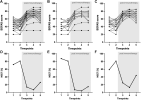InitialConditions
Senior Member (Voting Rights)
Background
Neuroimmune processes are often implicated in young people with atypical neuropsychiatric disorders, yet treatment implications remain controversial. This case series details young people with primary psychiatric disorders who received adjunctive immunotherapy after thorough investigation and extensive conventional treatments.
Methods
We evaluated 45 individuals (93% female, ages 12–30 years) with atypical psychiatric presentations suggesting potential neuroimmune involvement. Participants underwent clinical phenotyping, laboratory investigation, cerebrospinal fluid (CSF) analysis, neuroimaging, and/or electroencephalography. We tracked outcomes after personalized immunotherapy through global clinical improvement (Clinical Global Impressions-Global Improvement) and changes in social-occupational functioning (Social and Occupational Functioning Assessment Scale [SOFAS]), education/employment status (not in education, employment, or training [NEET]), psychiatric hospitalization, and medication use. Treatment response was assessed post-intervention, at 6 to 12 months, and at a long-term follow-up (78.2 ± 31.3 months).
Results
Participants presented with severe depression (80%), psychotic features (56%), treatment resistance (82%), and/or neurological symptoms (96%). Illness duration before immunotherapy was often prolonged (mean = 4.8 ± 4.7 years, median = 3 years). Autoantibodies were detected in serum or CSF in 64% of participants, while 91% showed elevated inflammatory markers. Of 43 individuals receiving immunotherapy, 88% experienced clinical improvement posttreatment, with 79% maintaining long-term benefits. Functional outcomes improved significantly: SOFAS scores increased from 43.2 ± 11.8 to 69.2 ± 9.8, while NEET rates declined from 81% to 14%. Psychiatric hospitalization dropped from 93% to 7%, and psychotropic medication use decreased from 84% to 9%. Earlier treatment predicted better outcomes (p = .025). Adverse effects occurred in 79% of participants, with 21% experiencing moderate-to-severe complications.
Conclusions
These findings suggest the importance of early identification and specialist assessment of atypical psychiatric presentations in young people. New guidelines need to support appropriate screening, personalized management, and long-term treatment and monitoring protocols.

